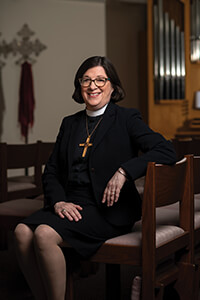Take and eat
March 6, 2020
At the end of the book of Acts there is the story of Paul’s journey to Rome. Paul had taken many journeys that were arduous and dangerous, but this last one was especially severe.
Paul was being taken to Rome to stand trial. He would be placed under house arrest and finally executed. While he couldn’t have known with certainty how his story would turn out, Paul did know that he wasn’t a free man. This was no Mediterranean cruise. Paul was a prisoner, and his physical comfort on the ship was of no concern to the captain or crew.
The ship ran into some nasty weather. Luke wrote: “We were being pounded by the storm so violently that on the next day they began to throw the cargo overboard, and on the third day with their own hands they threw the ship’s tackle overboard. When neither sun nor stars appeared for many days, and no small tempest raged, all hope for our being saved was at last abandoned” (Acts 27:18-20).
This must have been terrifying for the passengers, prisoners and crew. They weren’t sure where they were, they were cold and wet, and they had gone without food for days. They thought they were nearing land but couldn’t be certain and, while there was the prospect of finding harbor, it was just as likely that the ship would founder on rocks. Some of the crew tried to mutiny. They were afraid of being shipwrecked and didn’t believe Paul when he assured them that all would be saved. It was chaos.
It was at this point that Paul tells everyone it’s time to eat. “Just before daybreak, Paul urged all of them to take some food, saying, ‘Today is the fourteenth day that you have been in suspense and remaining without food, having eaten nothing. Therefore I urge you to take some food, for it will help you survive’” (Acts 27:33-34).
Those aboard the ship must have thought Paul had taken leave of his senses. They were facing shipwreck, everything they had tried to right the ship had failed, death was near, and they were panicked. And now Paul wants them to stop and eat? What a ridiculous waste of time and energy. People having dinner usually plan to be around after it.
Our Lord’s holy meal is an act of love, strength for the journey, forgiveness, and intimate communion with God and each other. It is also an act of resistance.
Paul’s encouragement to eat was an act of faith and trust. It was not in spite of the weather, or in denial of it, but precisely because of the storm and imminent destruction that Paul urged the people to eat. “After he had said this, he took bread; and giving thanks to God in the presence of all, he broke it and began to eat. Then all of them were encouraged and took food for themselves” (Acts 27:35-36).
We know these actions. Our Lord, on the night in which he was betrayed, took bread, gave thanks, broke it and gave it to his disciples. This is the food God gives us for forgiveness, life and salvation.
It is right for the church, in the midst of discouragement, in the middle of the storms that surround and threaten us, to take and eat. It is the church’s witness to the steadfast promise of God. When we’ve tried everything we can do to right the ship and we’re still headed for the rocks, Jesus says, “Take and eat.” When all rational thought confirms that there is no hope, Jesus says, “Take and eat.” When deadly powers within and around us threaten to extinguish us, Jesus says, “Take and eat.”
Our Lord’s holy meal is an act of love, strength for the journey, forgiveness, and intimate communion with God and each other. It is also an act of resistance. Before his arrest and crucifixion, on his way to the cross—the ultimate showdown with death—Jesus stopped to eat. Death was defeated.
When the church gathers at the table, it is also our act of resistance to death and hopelessness. In the storm and the shipwreck around us, we stop to eat in the confidence that we will be around after dinner.


